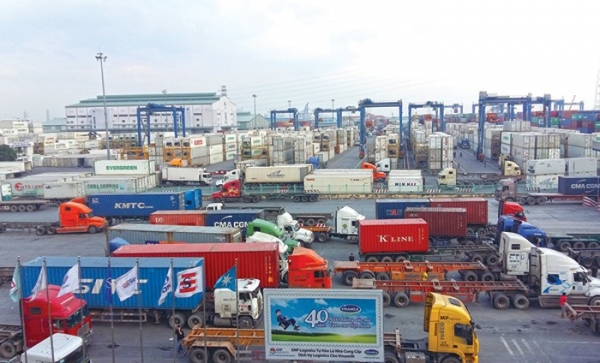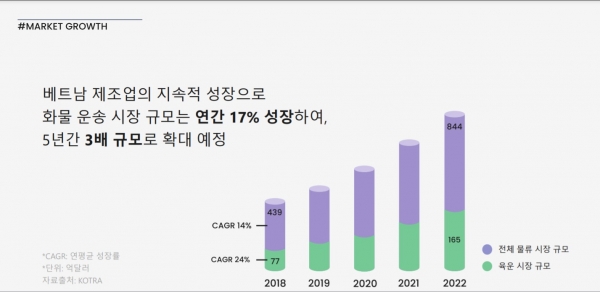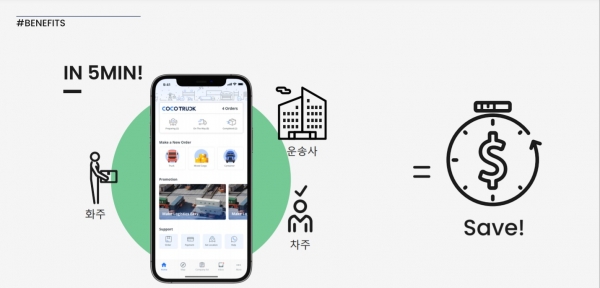Vietnam cargo transportation market grows 17% annually
Logistics costs account for 25% of Vietnam's GDP
Startup Autobahn Selection, Collaboration with Daimler Group
Manufacturing can only grow if it is supported by an efficient logistics system. This is why logistics platform unicorns are emerging in emerging countries where manufacturing is developed or developing, including China, Vietnam, Indonesia, and the Philippines.

Vietnam builds ‘Uber on trucks’
Coconut Silo, a domestic ‘logistics platform’ startup, has focused on the Vietnamese market among many emerging manufacturing countries.
According to data from the Ministry of Industry and Trade of Vietnam, there are about 4,000 local logistics companies in Vietnam. According to data from KOTRA (Korea Trade-Investment Promotion Agency), the size of the Vietnamese cargo transportation market is growing by 17% annually. However, compared to the overflowing cargo trucks and cargo volume, shippers have limited options for cargo transportation. Communication methods are also sticking to analog methods such as phone calls. The reason Coconut Silo focused on the Vietnamese logistics market is because it saw that there were still many inefficiencies that needed to be improved compared to the increasing demand.

“As emerging economies such as Vietnam grow, the area of cargo trucks transporting goods is also becoming more prominent,” said Kang-Yeop Ahn, CEO of Coconut Silo. “That was the biggest factor in targeting that market.” Coconut Silo plans to expand its logistics platform from Vietnam to all of Southeast Asia, where the logistics industry is growing.
Coconut Silo builds a logistics platform that unites the Vietnamese logistics market. It connects shippers who request the transport of goods, logistics companies that mediate cargo, and truck owners who transport them into one platform. Shippers and logistics companies are mostly companies that produce goods, and truck owners are individuals who drive trucks.
Kim Seung-yong, CEO of Coconut Silo, explained, “In Vietnam, logistics costs account for 25% of GDP (gross domestic product),” and “It is inefficient to have a system where the transportation company calls the driver to check the location of each item when determining the location of the logistics. We thought that this factor was the cause of the high logistics costs, so we set out to build a logistics platform.”
Coconut Silo provides a mobile application called 'Coco Truck' for shippers and transporters. The app for shippers can be downloaded from Google Play Store and Apple App Store. Shippers on the Coconut Silo platform can enter simple information and request a truck call. The information that shippers need to enter is 'departure point, destination,' 'type of transported cargo,' 'truck tonnage,' and 'number of trucks required.' Shippers can receive a guarantee for their cargo during transport. Cargo in transit can be tracked through the app.

Coconut Silo's smart integrated system can deliver multiple cargoes at once. If the truck is far from the garage, the matchback algorithm can allow the truck driver to receive an order close to the garage. The concept is to transport cargo from Seoul to Busan and then bring it back from the transit point instead of just returning. Director Ahn Kang-yeop explained, "The existing logistics industry is doing matchbacks in an analog way," and "It is based on human judgment and dispatcher judgment, but through a smart system based on an algorithm, both time and fuel costs can be reduced."
Coconut Silo plans to generate additional revenue through a third-party model-based revenue model, such as brokerage for vehicle maintenance, in addition to transportation arrangement fees. CEO Seungyong Kim said, “In addition to commission revenue, we plan to build an additional revenue model by selling cargo insurance, vehicle insurance, etc. through the platform,” and explained, “By signing agreements with fuel, insurance, and maintenance companies, the company will be able to receive commissions and provide benefits to platform users.”
Collaborating with the German Daimler Group
Last year, Mercedes-Benz Korea was selected for 'STARTUP AUTOBAHN', a startup incubation platform of Daimler Group, and is currently pursuing collaboration with Daimler Group.
We are developing a service that allows customers to reserve and check Daimler’s maintenance network through a mobile app. In the future, we aim to create an integrated solution that not only manages vehicles but also manages them periodically through the app. Director Ahn Kang-yeop said, “We are aiming for an integrated solution for vehicle management that goes beyond mobile maintenance reservations,” and “We aim to build a system that notifies customers one month in advance of regular inspections, such as engine oil change cycles and consumable replacement cycles, and manages vehicles.”
Coconut Silo completed PoC (Proof of Concept) last year. It completed technical verification of local logistics company owners, local platform technology, local customer satisfaction, and unexpected problem factors.
CEO Kim Seung-yong worked in the commercial project team of Hyundai Motor Company’s R&D headquarters before being selected through an internal venture competition at Hyundai Motor Company. Coconut Silo was spun off from Hyundai Motor Company in June of last year.
CEO Kim Seung-yong said, "The company's name contains the meaning of a rocket silo when launching a rocket," and "Ultimately, we want to expand the logistics platform by targeting the coconut line not only in Vietnam but also in Southeast Asia and South Asia."





